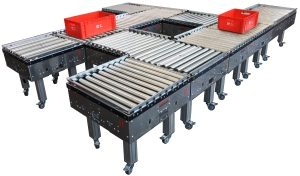In 2012, 18 new companies were established at Karlsruhe Institute of Technology (KIT). They complement the already existing large range of enterprises. Apart from new spinoffs, such as the company of Flexlog in the logistics area, the online service Reposito and established companies, such as the worldwide active manufacturer of medical products Admedes Schuessler, are among the spinoffs of KIT. KIT’s concept for enhancing entrepreneurial culture at the university was among the winners of the “EXIST – Gründungskultur” competition launched by the Federal Ministry of Economics and Technology in January this year. This concept is aimed at increasing the number of successful startups.
Among the 18 new companies established in the past year are 4 spinoffs and 14 startups. While spinoffs are companies based directly on technologies, products or methods of science and develop and commercialize them further, startups are based on new creative ideas of students that have a considerable market potential. Contrary to spinoffs, they do not use protected know-how of KIT. The ideas for startups in 2012 ranged from a “safety tube” for water sports that is blown up like a life vest to a calendar of events and a portal for fashion catalogues as smart phone applications (apps) to tailor-made suits, a service for changing the energy supplier, and a service for the use and operation of electric vehicles for the transportation of passengers and goods. Newly established spinoffs commercialize special carbon black and fine dust removal systems for boilers and ovens or biological transport molecules, by means of which nucleic acids, such as the DNA, are transported into the cell interior.
Flexlog: A Decentralized Conveyor System
Flexlog GmbH is one of four spinoffs of KIT established in 2012. The company commercializes the “Flexförderer” (flexible conveyor) developed by the Institute for Materials Handling and Logistics. This decentralized conveyor system consists of square modules of identical design that can be joined like Lego pieces. Every module is equipped with a computation unit, the size and performance of which correspond to those of a smart phone. This unit records the transportation direction of the goods. “The flexible conveyor is based on the plug&play principle: Join the units, switch on electricity, and the system starts to work, “ says Dr. Thomas Stoll, who established the company and was involved in the development of the conveyor system from its very beginnings. A central control unit is not required, as the modules are connected to each other. “Only a few seconds are needed to modify the conveyor route and to exchange damaged modules,” says co-founder Dr. Thomas Rummert. “During this time, the conveyor system automatically searches for an alternative route, such that the flow of goods is not interrupted.” www.flexlog.com
Reposito: Online Archive for Sales Slips
The pump of the washing machine has stopped working, the guarantee is still valid, but the sales slip cannot be found anywhere? The cost-free online service Reposito offers a solution: It digitizes sales slips, letters of guarantee or comparable documents, collects, archives, and administrates them. Presently, Reposito is available as smart phone app for the iPhone and android phones as well as directly via the internet. “Users can electronically acquire sales slips and bar codes via cameras, scanners, or the webcam, and the relevant product information is available immediately,” says Adrian Runte, who established the startup in April 2011. Via the app, the smart phone data are compared with and adjusted to the online archive. The sales slips stored can be accessed from every internet-capable end device and used as valid copies for legal warranties or guarantees. Reposito also informs about guarantee deadlines and product recalls. www.reposito.com
Admedes Schuessler: Nitinol Stents
Admedes Schuessler GmbH was a spinoff of the former Forschungszentrum Karlsruhe, today’s KIT, and founded in 1996. At that time, Dr. Andreas Schüßler who founded the company worked on new laser structurization methods for metals and developed first laser microtechniques for the cutting and joining of nitinol. As the nickel-titanium alloy is elastic and biologically compatible, it is suited for use in the medical sector. Moreover, it has a shape memory: Nitinol objects always assume their original shape after strong deformations. Admedes Schuessler has specialized in the manufacture of vascular implants made of nitinol: Stents, small mesh tubes, are used to extend and keep open constricted hollow organs, such as leg arteries or coronary blood vessels. “Within a period of 15 years, we have developed to the worldwide leading manufacturer of nitinol stents,” says Schüßler. Annual production of the company totals more than 400,000 implants. The company office is located at Pforzheim. www.admedes.com
Founding at KIT
Scientists who are interested in establishing their own enterprises at KIT are supported by the Innovation Management Service Unit (IMA) in the market-oriented further development of their research results and business ideas. IMA provides support relating to the protection of rights, cooperation and license contracts, the establishment of enterprises, and participation of KIT in the company. Students are free to contact the Center for Entrepreneurship (CfE). Services of CfE range from advice to concept development to the establishment of contacts between persons interested in establishing startups and co-founders or investors to the supply of infrastructure and funding. www.gruenden.kit.edu
In close partnership with society, KIT develops solutions for urgent challenges – from climate change, energy transition and sustainable use of natural resources to artificial intelligence, sovereignty and an aging population. As The University in the Helmholtz Association, KIT unites scientific excellence from insight to application-driven research under one roof – and is thus in a unique position to drive this transformation. As a University of Excellence, KIT offers its more than 10,000 employees and 22,800 students outstanding opportunities to shape a sustainable and resilient future. KIT – Science for Impact.

